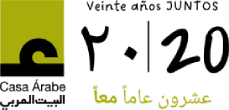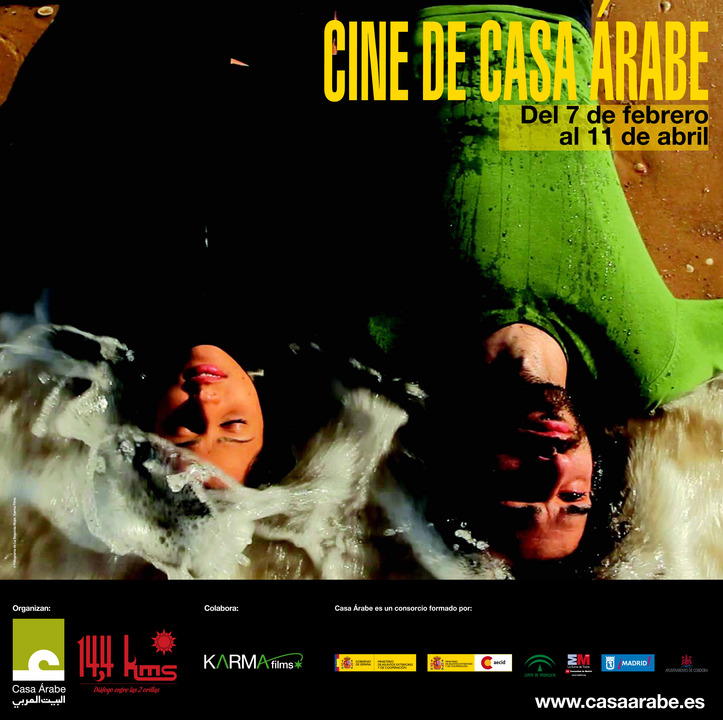Films
Index / Activities / Films / Casa Árabe Cinema
Casa Árabe Cinema
From February 10, 2014 until April 11, 2014
The best in Arab audiovisualsNext date:11/04/2014. MADRID
Starting in February, we will be bringing the best of Arab cinema back to the big screen. This time we are presenting five films, which have received great international acclaim, and in which women play the starring roles. These screenings have been made possible by a collaborative effort with the film festival 14,4 Km –Intercultural Dialogue Between the Shores of the Mediterranean, and with Karma Films.
All of the films will be shown at 7:30 p.m., in the Casa Árabe auditorium (at Calle Alcalá, 62) in the original language version with subtitles in Spanish. Tickets sold through our website, at the bottom of this page. Discounts for purchases made online.
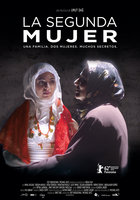 When Ayse celebrates her wedding in the town where she lives, everybody thinks she is marrying Hasan, a handsome youth a bit older than her. However, Ayse is actually leaving Turkey to become the second wife of Mustafa, Hasan’s father. When she reaches her new home in Vienna, some of the older children turn their back on her, but Fatma, Mustafa’s first wife, welcomes her in as a fine successor who will assist her and take care of the family when she is no longer around. The two women begin a very special friendship based on complete trust. But this relationship will be questioned when the family is forced to deal with a difficult twist of fate. Kuma is the story of the relationship between these two women and the conflicts which arise when Ayse goes beyond the limits which Fatma had always valued.
When Ayse celebrates her wedding in the town where she lives, everybody thinks she is marrying Hasan, a handsome youth a bit older than her. However, Ayse is actually leaving Turkey to become the second wife of Mustafa, Hasan’s father. When she reaches her new home in Vienna, some of the older children turn their back on her, but Fatma, Mustafa’s first wife, welcomes her in as a fine successor who will assist her and take care of the family when she is no longer around. The two women begin a very special friendship based on complete trust. But this relationship will be questioned when the family is forced to deal with a difficult twist of fate. Kuma is the story of the relationship between these two women and the conflicts which arise when Ayse goes beyond the limits which Fatma had always valued.
Screenings: February 7 and April 11
To see a preview, click here.
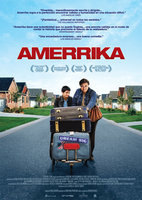 Knowing that it is the only way to find a better future, Muna and her teenage son, Fadi, leave Palestine in search of a new life in a small Illinois town. Muna’s sister, her husband and their three daughter let the newcomers move into their house. There they will have to strive to fit into a new culture without leaving their own behind, facing an environment which views everything from the Middle East with mistrust after the invasion of Iraq. While Fadi finds a friend in his rebellious cousin and gets into trouble at high school, dauntless Muna never loses hope, and despite having to live a double life working at a local hamburger restaurant, she tackles this new stage of life with optimism, teaching her a son a lesson that he will never forget.
Knowing that it is the only way to find a better future, Muna and her teenage son, Fadi, leave Palestine in search of a new life in a small Illinois town. Muna’s sister, her husband and their three daughter let the newcomers move into their house. There they will have to strive to fit into a new culture without leaving their own behind, facing an environment which views everything from the Middle East with mistrust after the invasion of Iraq. While Fadi finds a friend in his rebellious cousin and gets into trouble at high school, dauntless Muna never loses hope, and despite having to live a double life working at a local hamburger restaurant, she tackles this new stage of life with optimism, teaching her a son a lesson that he will never forget.
Screenings: February 14 and March 14
To see a preview, click here.
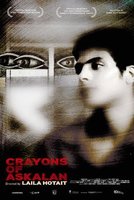 In 1975, at the age of fifteen, Zuhdi is found guilty and sentenced to fifteen years at the high-security prison in Askalan, Israel, becoming the youngest there and one of the first captured from the Palestinian resistance. While in jail, Zuhdi finds a way to express himself in art, and he manages to weave together a network through which his cellmates and family help him smuggle colored crayons in. Using these crayons, he finishes nearly a hundred drawings at night while hiding from his jailors. During visits, he smuggles them back out.
In 1975, at the age of fifteen, Zuhdi is found guilty and sentenced to fifteen years at the high-security prison in Askalan, Israel, becoming the youngest there and one of the first captured from the Palestinian resistance. While in jail, Zuhdi finds a way to express himself in art, and he manages to weave together a network through which his cellmates and family help him smuggle colored crayons in. Using these crayons, he finishes nearly a hundred drawings at night while hiding from his jailors. During visits, he smuggles them back out.
Screenings: February 21 and March 21
To see a preview, click here.
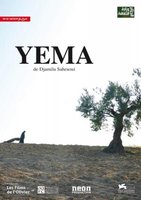 Somewhere in Algeria, at a small house abandoned in the middle of the countryside, Ouardia has buried her son Tariq, a soldier who may have been murdered by his brother Ali, the leader of a fundamentalist faction. The woman lives under the watch of a man from Ali’s group. In this universe of tension and pain, with the added weakness caused by drought, life begins to regain its strength once again. Thanks to the vegetable garden Ouardia brings back to life through her perseverance; thanks to her guard, who is also a victim that the woman ends up adopting; thanks, above all, to the arrival of the son of Malia, a woman who dies in childbirth and whom both brothers had loved. However, Ouardia’s suffering is not over yet. Ali returns home severely wounded…
Somewhere in Algeria, at a small house abandoned in the middle of the countryside, Ouardia has buried her son Tariq, a soldier who may have been murdered by his brother Ali, the leader of a fundamentalist faction. The woman lives under the watch of a man from Ali’s group. In this universe of tension and pain, with the added weakness caused by drought, life begins to regain its strength once again. Thanks to the vegetable garden Ouardia brings back to life through her perseverance; thanks to her guard, who is also a victim that the woman ends up adopting; thanks, above all, to the arrival of the son of Malia, a woman who dies in childbirth and whom both brothers had loved. However, Ouardia’s suffering is not over yet. Ali returns home severely wounded…
Screenings: February 28 and March 28
To see a preview, click here.
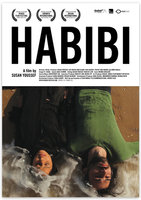 A modern-day adaptation of the Sufi parable of Majnun Layla, this film tells the story of two students who return to Gaza from the West Bank and of their forbidden love. Gaza’s walls are filled with graffiti and the poems which Qays writes for his beloved. In an open-air jail, these prisoners to the logic of social and political conventions are seeking freedom. This film is the first feature-length fictional film to be set in Gaza in 15 years.
A modern-day adaptation of the Sufi parable of Majnun Layla, this film tells the story of two students who return to Gaza from the West Bank and of their forbidden love. Gaza’s walls are filled with graffiti and the poems which Qays writes for his beloved. In an open-air jail, these prisoners to the logic of social and political conventions are seeking freedom. This film is the first feature-length fictional film to be set in Gaza in 15 years.
Screenings: March 7 and April 4.
To see a preview, click here.
You can buy tickets at the bottom of this page. Select the session which you would like to attend, and purchase your tickets in a few easy steps, at a discount. If, for technical reasons, you are unable to buy the tickets on this website, the tickets will go on sale at the box office one hour before the film screening begins.
Price: 3 euros for general entrance tickets at the box office. 2 euros for tickets purchased online and for the officially unemployed, Arabic language center students and youth card holders. You must accredit your status with the proper documentation in order to receive the discount. Tickets purchased online may not be changed or refunded.
All of the films will be shown at 7:30 p.m., in the Casa Árabe auditorium (at Calle Alcalá, 62) in the original language version with subtitles in Spanish. Tickets sold through our website, at the bottom of this page. Discounts for purchases made online.
Film Dates
Kuma, by Umut Dag (Austria, Turkey, 2012, 93 minutes)
 When Ayse celebrates her wedding in the town where she lives, everybody thinks she is marrying Hasan, a handsome youth a bit older than her. However, Ayse is actually leaving Turkey to become the second wife of Mustafa, Hasan’s father. When she reaches her new home in Vienna, some of the older children turn their back on her, but Fatma, Mustafa’s first wife, welcomes her in as a fine successor who will assist her and take care of the family when she is no longer around. The two women begin a very special friendship based on complete trust. But this relationship will be questioned when the family is forced to deal with a difficult twist of fate. Kuma is the story of the relationship between these two women and the conflicts which arise when Ayse goes beyond the limits which Fatma had always valued.
When Ayse celebrates her wedding in the town where she lives, everybody thinks she is marrying Hasan, a handsome youth a bit older than her. However, Ayse is actually leaving Turkey to become the second wife of Mustafa, Hasan’s father. When she reaches her new home in Vienna, some of the older children turn their back on her, but Fatma, Mustafa’s first wife, welcomes her in as a fine successor who will assist her and take care of the family when she is no longer around. The two women begin a very special friendship based on complete trust. But this relationship will be questioned when the family is forced to deal with a difficult twist of fate. Kuma is the story of the relationship between these two women and the conflicts which arise when Ayse goes beyond the limits which Fatma had always valued.Screenings: February 7 and April 11
To see a preview, click here.
Amreeka, by Cherien Dabis (United States, Canada and Kuwait, 2009, 96 minutes)
 Knowing that it is the only way to find a better future, Muna and her teenage son, Fadi, leave Palestine in search of a new life in a small Illinois town. Muna’s sister, her husband and their three daughter let the newcomers move into their house. There they will have to strive to fit into a new culture without leaving their own behind, facing an environment which views everything from the Middle East with mistrust after the invasion of Iraq. While Fadi finds a friend in his rebellious cousin and gets into trouble at high school, dauntless Muna never loses hope, and despite having to live a double life working at a local hamburger restaurant, she tackles this new stage of life with optimism, teaching her a son a lesson that he will never forget.
Knowing that it is the only way to find a better future, Muna and her teenage son, Fadi, leave Palestine in search of a new life in a small Illinois town. Muna’s sister, her husband and their three daughter let the newcomers move into their house. There they will have to strive to fit into a new culture without leaving their own behind, facing an environment which views everything from the Middle East with mistrust after the invasion of Iraq. While Fadi finds a friend in his rebellious cousin and gets into trouble at high school, dauntless Muna never loses hope, and despite having to live a double life working at a local hamburger restaurant, she tackles this new stage of life with optimism, teaching her a son a lesson that he will never forget.Screenings: February 14 and March 14
To see a preview, click here.
Crayons of Askalan, by Laila Hotait (Lebanon, Spain, 2011, 52 minutes)
 In 1975, at the age of fifteen, Zuhdi is found guilty and sentenced to fifteen years at the high-security prison in Askalan, Israel, becoming the youngest there and one of the first captured from the Palestinian resistance. While in jail, Zuhdi finds a way to express himself in art, and he manages to weave together a network through which his cellmates and family help him smuggle colored crayons in. Using these crayons, he finishes nearly a hundred drawings at night while hiding from his jailors. During visits, he smuggles them back out.
In 1975, at the age of fifteen, Zuhdi is found guilty and sentenced to fifteen years at the high-security prison in Askalan, Israel, becoming the youngest there and one of the first captured from the Palestinian resistance. While in jail, Zuhdi finds a way to express himself in art, and he manages to weave together a network through which his cellmates and family help him smuggle colored crayons in. Using these crayons, he finishes nearly a hundred drawings at night while hiding from his jailors. During visits, he smuggles them back out.Screenings: February 21 and March 21
To see a preview, click here.
Yema, by Djamila Sahraoui (Algeria, France, 2011, 90 minutes)
 Somewhere in Algeria, at a small house abandoned in the middle of the countryside, Ouardia has buried her son Tariq, a soldier who may have been murdered by his brother Ali, the leader of a fundamentalist faction. The woman lives under the watch of a man from Ali’s group. In this universe of tension and pain, with the added weakness caused by drought, life begins to regain its strength once again. Thanks to the vegetable garden Ouardia brings back to life through her perseverance; thanks to her guard, who is also a victim that the woman ends up adopting; thanks, above all, to the arrival of the son of Malia, a woman who dies in childbirth and whom both brothers had loved. However, Ouardia’s suffering is not over yet. Ali returns home severely wounded…
Somewhere in Algeria, at a small house abandoned in the middle of the countryside, Ouardia has buried her son Tariq, a soldier who may have been murdered by his brother Ali, the leader of a fundamentalist faction. The woman lives under the watch of a man from Ali’s group. In this universe of tension and pain, with the added weakness caused by drought, life begins to regain its strength once again. Thanks to the vegetable garden Ouardia brings back to life through her perseverance; thanks to her guard, who is also a victim that the woman ends up adopting; thanks, above all, to the arrival of the son of Malia, a woman who dies in childbirth and whom both brothers had loved. However, Ouardia’s suffering is not over yet. Ali returns home severely wounded…Screenings: February 28 and March 28
To see a preview, click here.
Habibi, by Susan Youssef (Holland, United States, Palestine, United Arab Emirates, 2011, 78 minutes)
 A modern-day adaptation of the Sufi parable of Majnun Layla, this film tells the story of two students who return to Gaza from the West Bank and of their forbidden love. Gaza’s walls are filled with graffiti and the poems which Qays writes for his beloved. In an open-air jail, these prisoners to the logic of social and political conventions are seeking freedom. This film is the first feature-length fictional film to be set in Gaza in 15 years.
A modern-day adaptation of the Sufi parable of Majnun Layla, this film tells the story of two students who return to Gaza from the West Bank and of their forbidden love. Gaza’s walls are filled with graffiti and the poems which Qays writes for his beloved. In an open-air jail, these prisoners to the logic of social and political conventions are seeking freedom. This film is the first feature-length fictional film to be set in Gaza in 15 years. Screenings: March 7 and April 4.
To see a preview, click here.
You can buy tickets at the bottom of this page. Select the session which you would like to attend, and purchase your tickets in a few easy steps, at a discount. If, for technical reasons, you are unable to buy the tickets on this website, the tickets will go on sale at the box office one hour before the film screening begins.
Price: 3 euros for general entrance tickets at the box office. 2 euros for tickets purchased online and for the officially unemployed, Arabic language center students and youth card holders. You must accredit your status with the proper documentation in order to receive the discount. Tickets purchased online may not be changed or refunded.
